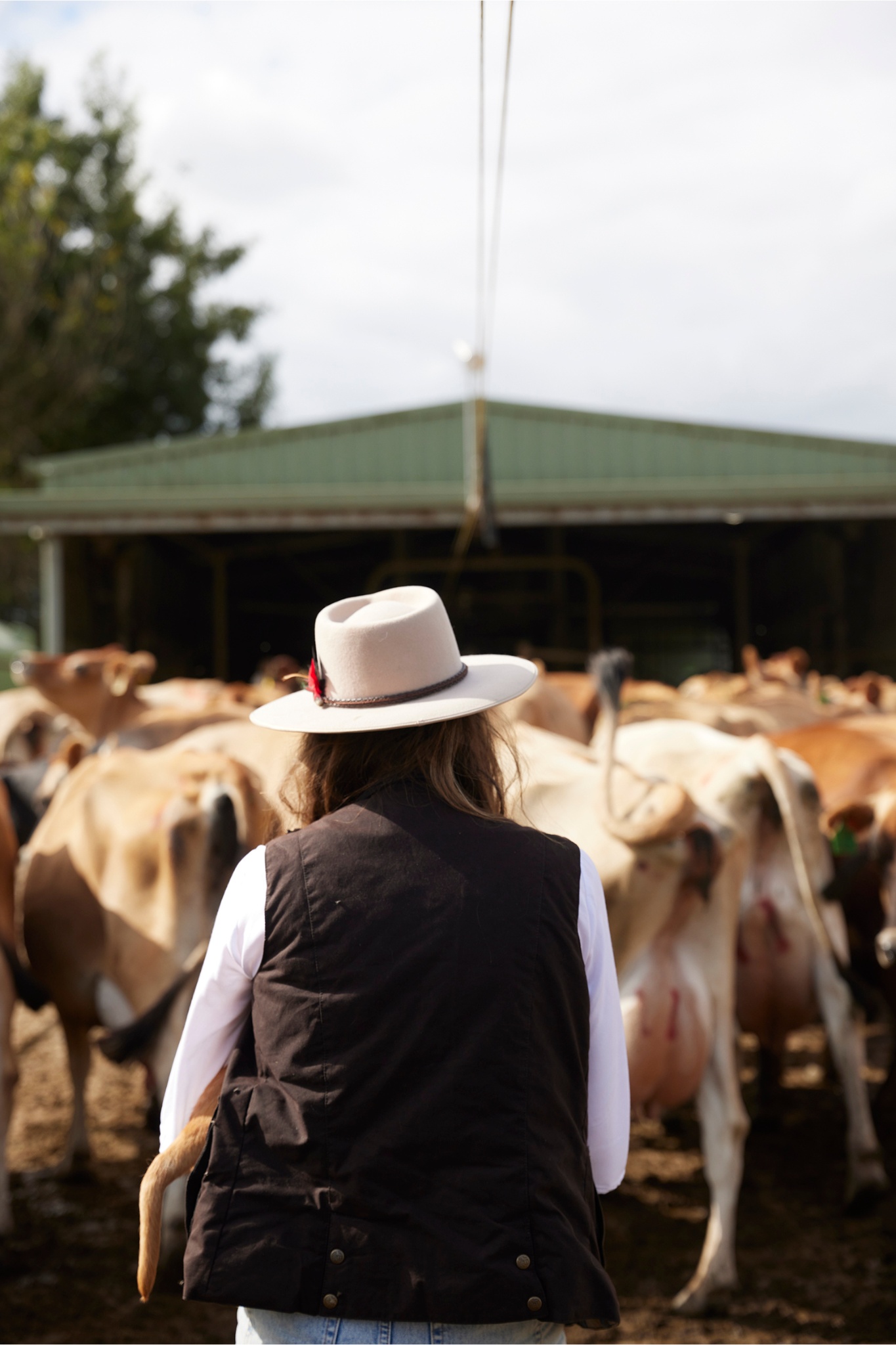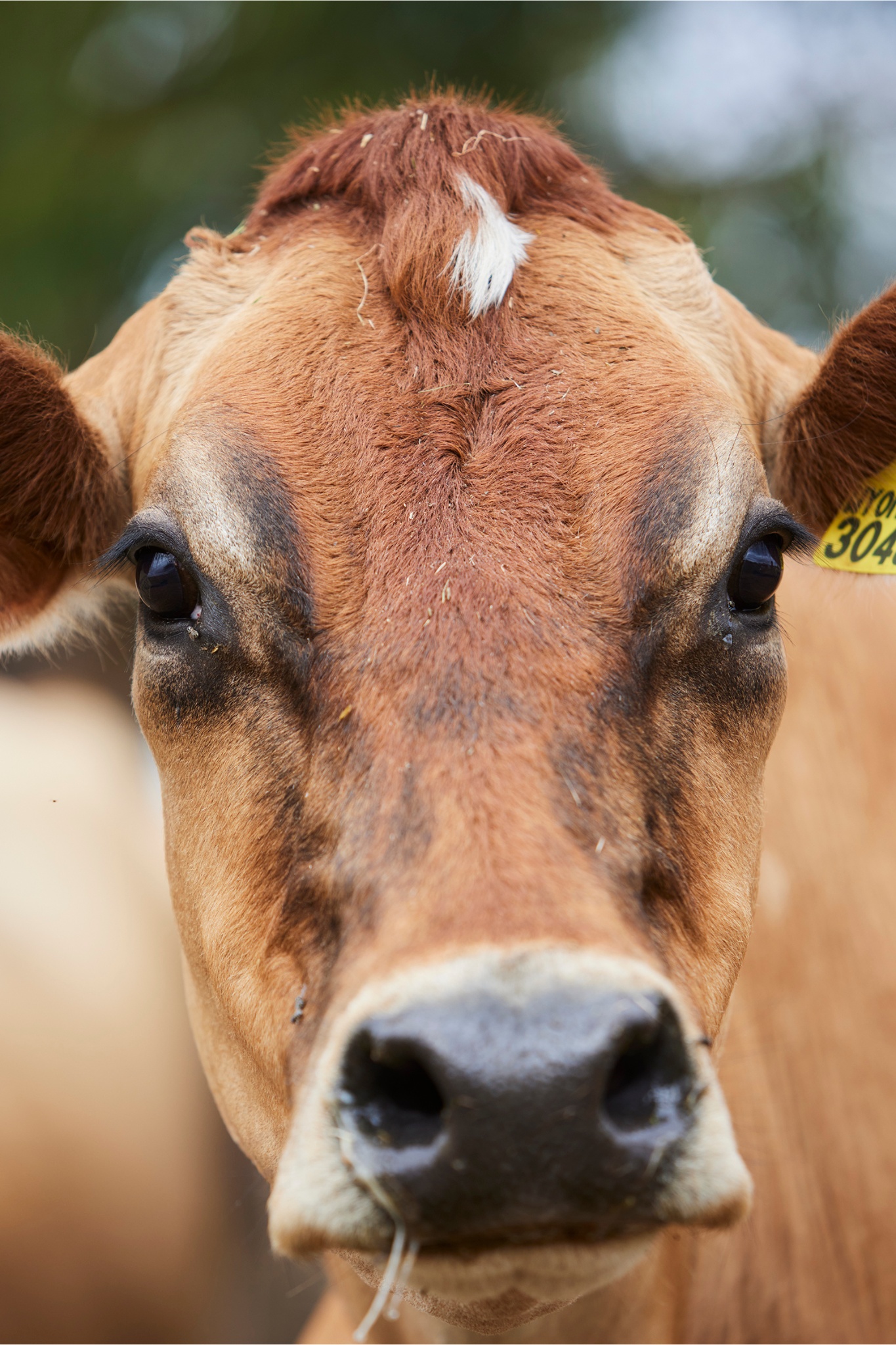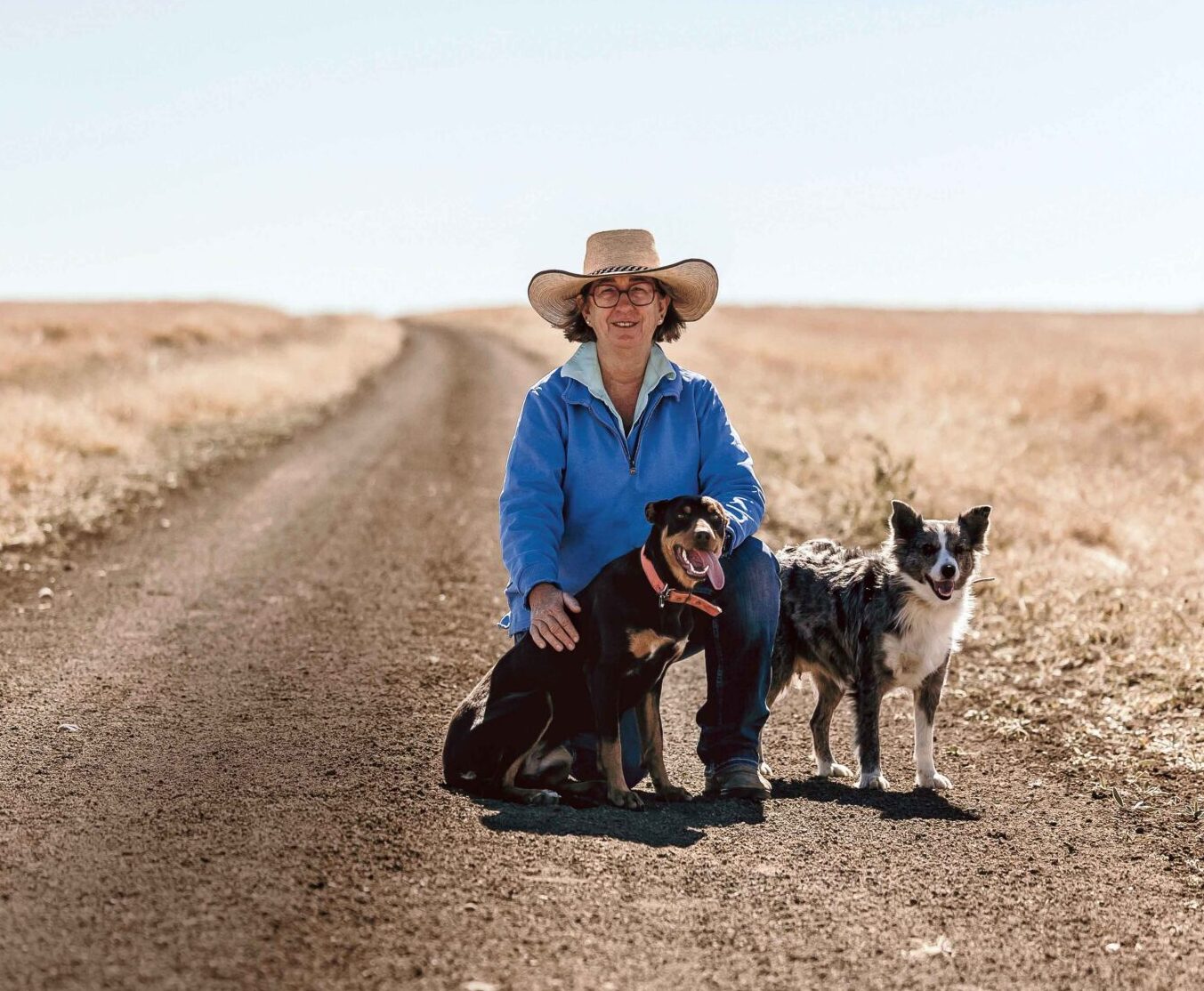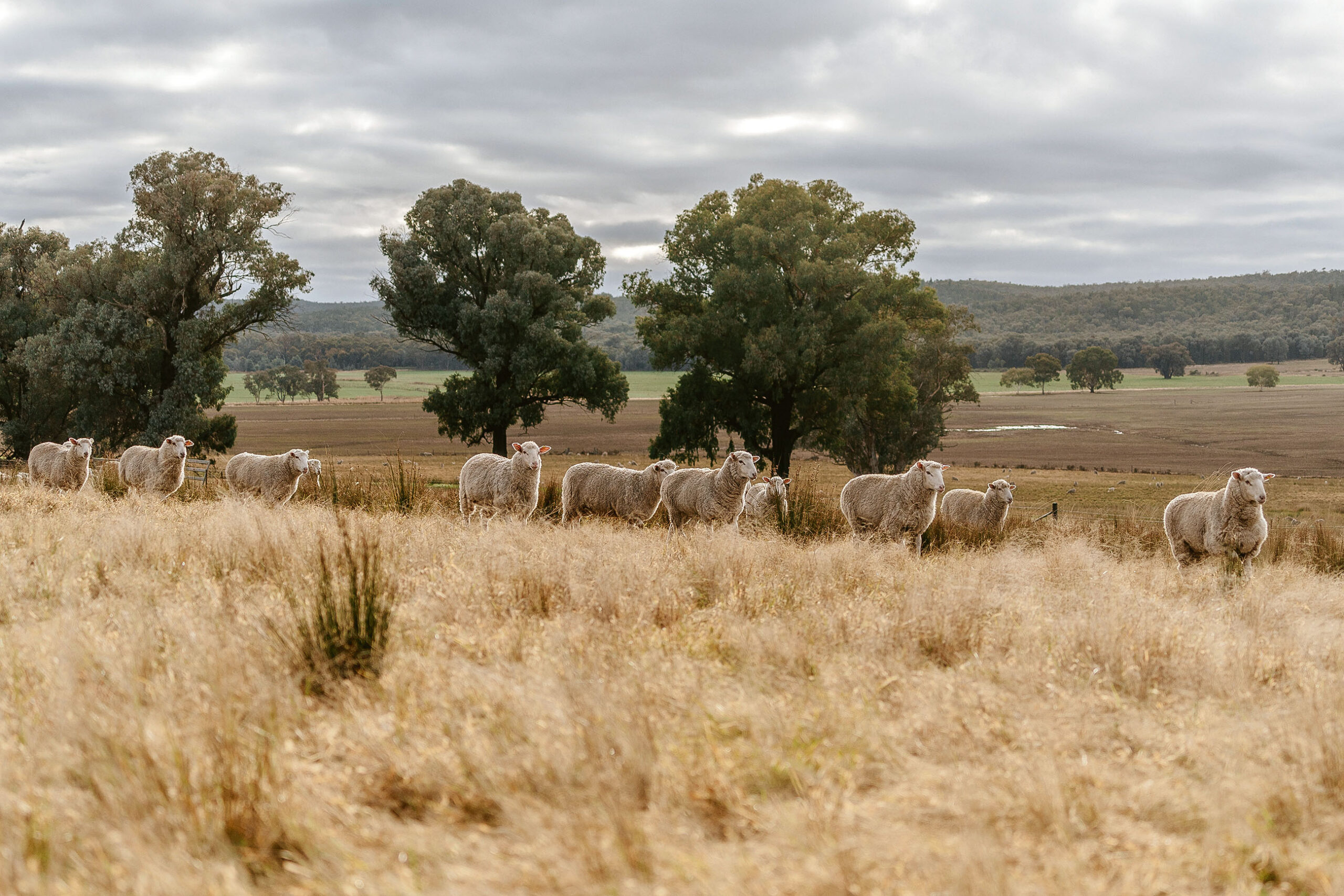Photography Mark Roper.
Sign up to our mailing list for the best stories delivered to your inbox.
When her father ended his own life — just as his beloved dairy industry faced a national crisis — Sallie set about securing a fair price for dairy farmers.
Words Emily Herbert Photography Mark Roper

Photography Mark Roper.

Photography Mark Roper.
Just a heads-up: this article discusses suicide. If you — or someone you know — needs help, Lifeline is available 24/7. The number to call is 13 11 14.
“What would Dad do?” This is what Sallie Jones thought in the midst of the dairy crisis sweeping the nation in 2016. Sallie was a daughter of dairy farmers, a daughter of entrepreneurs and a daughter left reeling, grieving the loss of her father, Michael Bowen, who had ended his own life just weeks before.
“The one thing he hated about the dairy industry was that dairy farmers are just price takers and they can’t ever set their own prices. So he was always on a mission to add value and I guess all of us, as a family, were brought along on that ride.”
It was a Sunday, a chilly June afternoon, when Sallie first learned of her father’s mental health breakdown in 2013. She’d just managed to get her three children, all under three, down for a nap in her home in West Gippsland, Victoria, and was contemplating crawling into bed herself when her dad walked through the kitchen door.
“I was thinking, ‘I need you to hurry up because I want to go to sleep,’ when he started crying. I’d never seen my dad cry before,” the 42-year-old says. “He proceeded to tell me what was going on and it was unbelievable. I called my mum, who was overseas at the time, and I said, ‘I think Dad’s having a mental breakdown’. She said, ‘There’s no way. He’s such a strong, can-do, capable man’.”
It was the start of a long road for the family as they began to navigate Michael’s depression and eventual psychotic episodes.
“He went from being the parent to his kids being the carers,” she continues. “He was convinced that the world was ending, that we all needed to grow our own food and live in community. He put an unconditional offer on a big piece of land, which we didn’t have the money for. My sister and I ended up going to speak to the farmer and explain Dad’s mental health issues, and that he should never have made the deal. We thought we’d sorted it out and we could move forward and relieve his intense mental anguish, but then two weeks later, he decided to take himself out. It was devastating because never, ever did we think that he would do that. It was a massively life-defining moment for me.”
Sallie is a doer. It’s entwined in her DNA. With the collapse of the dairy industry, messages began to inundate the Warragul Farmers Market inbox — Sallie was a co-founder — asking how people could support local dairy farmers.
“Nearly all milk in the supermarket fridges is owned by large foreign companies where the profits don’t stay local,” Sallie says. People wanted better, and their emails spurred Sallie to action. The former public relations specialist called her family friend and dairy farmer, Steve Ronalds, who was nursing debt and questioning his industry at a time when a bottle of water cost more than a bottle of milk. Within days, they had created a dairy milk brand based on three pillars: a fair price for farmers, creating social change in rural mental health and, finally, kindness, plain and simple.
“Three months later we launched our milk, Gippsland Jersey, in a bottle at the Warragul Farmers Market, where we had no idea if it would even work,” Sallie explains. “We put 5000 litres in a milk tanker, sent it off to be processed and brought it back. We had hundreds of people show up to the market and rally around us.”
The strength of a story and a powerful voice was sparking serious interest on social media, where Sallie shared Gippsland Jersey’s beginnings. With four dairy farmers now part of the co-operative and a fifth coming on in 2023, Sallie’s quest to capture and instil her father’s legacy into something meaningful has created bow waves in the industry.
“We didn’t spend a dollar on marketing, simply because we didn’t have money to do it. It’s been word of mouth, wearing out pairs of boots pounding the pavement and having our community support. The journey’s just been amazing,” Sallie says. “The mental health pillar was really important for me, because I wanted to create more conversations in that space. I think that if my dad could have had those conversations or had other men around sharing their stories, maybe he wouldn’t have decided to end his life.”
Sallie had the brainwave of interviewing farmers about their unique mental health challenges and photographing them for a free calendar. The calendars hang above kitchen counters and on office walls around Australia. Amid the dates circled for birthdays and swimming carnivals and dentist appointments, are the real, unadulterated stories of Australian men and women on the land, their lives peppered with tribulations and triumphs.
“It was a very cathartic process, speaking to these farmers. They would open up to me and I would feel like I understood, and it was this beautiful — what do you call it? — incidental counselling, essentially. I just know that these are the stories my dad would have loved to have read.”
Eighteen months into the Gippsland Jersey brand’s operation another curveball hit: the processing plant they were using shut down, and Sallie and Steve were left scrabbling for another place to pack their milk.
“The last and only option we had was to go back to my family’s farm at Lakes Entrance in East Gippsland and process in dad’s old factory. But we had no money and we didn’t have a credit rating.”
They turned to their loyal fan base on social media. In three days, they presold thousands of bottles of milk, raising $110,000. “One café prepaid for $10,000 worth of milk. Many people chose not to claim their milk and basically donated the funds. It was an incredibly humbling experience,” Sallie says. “Steve spent a month figuring out how to get water into the factory. People showed up from around Australia, helping get rid of bramble and painting walls.”
Sallie puts a lot of her ability to think outside the box down to her unique childhood. The four siblings — one with autism and complex behavioural needs — were home schooled and helped with the milking twice a day, 365 days a year. When Sallie’s dad and granddad were away working on oil rigs, it was her mum, Jenny, and grandmother Audrey who held the fort, running the 160 hectare dairy farm, calving cows and operating the family’s value-adding ice-cream business.
“I think we’re very privileged, those of us who grow up on farms, because we have an extra level of being able to just do things or figure it out,” she says.
Sallie’s ultimate dream is for the Gippsland Jersey company to be profitable enough to create a FarmWell-style program: a concept already in place in Europe and North America, with working farms accommodating those who need mental health support, giving them jobs to do and a purpose in their days.
“I remember really trying to find a farm that my dad could go to, where he would be supported and helped, but it just didn’t exist in Australia. It’s the ultimate goal for me, which would be full circle,” Sallie says. “It might take 10 or 20 years for us to actually get there, though, because it’s got to be done properly.”
Seven years into the business and now boasting 400 stockists across Victoria — including Coles and Woolworths — Gippsland Jersey is going from strength to strength. Offering butter and sour cream as well as premium milk, it’s an operation embedded with value, purpose, quality and heart. Sallie still often asks herself what her dad would do.
“I probably wouldn’t have done any of it, if my dad hadn’t been so bold and such a pioneer in the space,” she says. “I really feel like I am riding on the coat-tails of his previous work.”
If you or a loved one need mental health support 24 hours a day, call Lifeline on 13 11 14 or visit lifeline.org.au to chat online.
Subscribe to Graziher and never miss an issue of your favourite magazine! Already a subscriber? You can gift a subscription to someone special in your life.
To hear more extraordinary stories about women living in rural and regional Australia, listen to our podcast Life on the Land on Apple Podcasts, Spotify and all major podcast platforms.

In her youth, she struggled to find her place. Now, Louise Martin knows exactly where she needs to be: in Tambo, Queensland, making sure rural children get the education they deserve.

Writer and photographer Alexandra MacAlpine finds ways to hold onto moments of peace amid the busyness of station life.